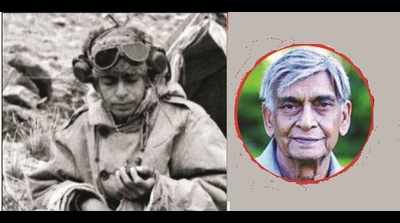- News
- City News
- bengaluru News
- This World War II veteran was a saviour in both life and death
Trending
This story is from August 10, 2016
This World War II veteran was a saviour in both life and death
On August 6, Chief of Army Staff General Dalbir Singh said in Madikeri that the country is indebted to its war veterans.

EPITOME OF GRIT: S Nila Kantan during his posting as an intelligence officer in Ladakh.
BENGALURU: On August 6, Chief of Army Staff General Dalbir Singh said in Madikeri that the country is indebted to its war veterans. On the same day, the body of a World War II veteran, who also saw action in post-Independent India, was stretchered into St John's Hospital in Bengaluru.
Captain (retd) S Nila Kantan, fondly called NK, died after a brief illness the previous day.He was 96. He had completed all the formalities for the donation of his body a few years ago when he was still fit. "He was very particular that he remains of some use even after his demise," his nephew Venu Gopal told TOI.
The story of NK, a brahmin by birth, is one of inspiration for a nation divided by caste and religion. Born in Tekubaka village along the Godavari's banks in February 1920, NK, joined the British Indian Army in 1939. The Indian Military Academy (IMA) in Dehradun was in its infancy then.
He had a long and successful career as a soldier - he fought for the allied forces in World War II and protected India's sovereignty in two wars. He was honoured with 24 medals.
A battle against discrimination
NK didn't stop fighting even after his retirement in 1968. This time inequality was the enemy. He dedicated the rest of his life to protecting the interests of dalits in a small village.
An ADC (aide-de-camp) or personal assistant to then Army chief Paramasiva Prabhakar Kumaramangalam, NK, who was unmarried, was urged by the former to come to Hosur and settle down there. Hence began the second phase of NK's battle. While the first few years were spent in his boss helping him set up a stud farm, NK soon got out of there and took refuge in Govinda Agraharam, which his family describes as a predominantly dalit village in Krishnagiri, about 90km southeast of Bengaluru.
As per the 2011 census, of the 979 houses in the village, 68% (667) belong to the Scheduled Castes (SCs) and Scheduled Tribes (STs). From the mid-1970s, NK spent all his life there, barring a few visits to relatives' homes in Bengaluru, the US and UK. NK, who was inspired by Maharishi Mahesh Yogi, founder of the Transcendental Meditation technique, convinced the latter to set up a school in the village.
"He relentlessly fought for equality - be it preventing dalits from drawing water from wells or getting them educated," said Dr Mani, vice-principal of Maharishi Vidyamandir, and someone who knew NK for over three decades.
"He spent all his pension money on people like us. He had very little savings," said Aruna, 25, who, along with her two siblings was educated by NK. In over 30 years, he adopted more than 23 children. Aruna and her siblings lived in his house since they were three years old. Today, Aruna is an MSc holder in biotechnology, while her brother Ashok, 22, is working with TCS and sister, Archana, 18, has just enrolled into BBM.
NK's years in uniform
He witnessed China, Pak wars
It was when the struggle for Independence was at its peak that Nila Kantan (NK) joined the British Indian Army. NK scribbled in his notes, which his family has got printed now, “The British officers considered the pedigree, wealth and status of boys while selecting... A person like me from a lower middle class family could never dream of becoming an Army officer under British rule. I was very surprised when I was given a warrant rank.”
He was called to Pune a week after he was commissioned. “...I had no training. Wore no uniform. I went by the meter gauge train from Bangalore to Poona via Hubli (sic). I travelled second class,” NK wrote. His life as a soldier began at a “very big military camp” in Wanowrie near Pune. From there, he travelled to places like Sudan, Kenya, Ethiopia and Greece, fighting for the allied forces in World War II braving harsh conditions.
When India became independent, he was in Quetta, the capital of Balochistan in Pakistan. He described what he witnessed as an experience worse than the war. “He couldn’t bear the treatment being meted out to our own people, he saw trains being burnt and people being hacked to death. He vividly remembered how a Muslim friend helped him reach Delhi unharmed,” his grandniece Vasanti V said.
He was in the thick of things in the 1962 Chinese aggression — just before that he was posted in Ladakh as an intelligence of?cer — and the 1965 Indo-Pak war. He even went on the UN Mission to Laos.
Villagers remember their hero
The government may have forgotten this soldier but the people of Govinda Agraharam haven’t. The villagers are holding a memorial service for him on Thursday. “He had a lasting imapct on all of us and it is only natural that the villagers want to remember him even after his death,” said Dr Mani.
“There was nothing that he did not know. And, there was no one who couldn’t approach him,” said Aruna.
NK’s family members, Venu and Vasanti, said: “This is only a reflection of his commitment to the people. We were overwhelmed when we were invited to be part of the memorial service.”
End of Article
FOLLOW US ON SOCIAL MEDIA










